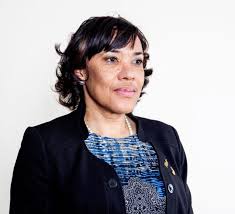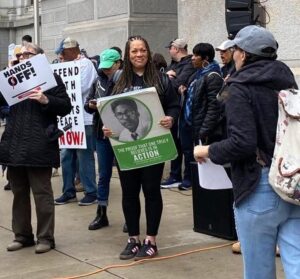By Tracy Chiles McGhee
In a twisted irony, April Earth Day celebrations coincide with the 10th anniversary of the Flint Water Crisis. The disaster was triggered April 25, 2014 when a state-appointed manager initiated a cost-saving switch from Detroit’s water system to the Flint River. That reckless decision gave the residents of this majority Black Michigan city disease-ridden water tainted with lead and bacteria.
The water system, untested or treated, pumped into hazardous pipes that flowed into thousands of homes and facilities. This inaction would lead to immeasurable mental and physical suffering. The water contamination was heaped upon coverups and malfeasance by the state’s top officials.
For many Flint residents, the initial discovery was obvious to the naked eye—discolored water, foul-smelling and so unsafe that the devastating results are still not fully known.
Legions of community leaders, truth tellers, and everyday citizens would take on this huge crisis for justice in one of the poorest cities in America. The recent revelations of water contamination in Jackson, Mississippi confirm the certainty of untold “Flint-like” disasters across the county.
From Flint to global communities, the fight goes on for quality water, a natural resource needed to replenish and to keep us alive. If we don’t make great strides to protect and cherish the gifts of Mother Earth, there will be dire consequences.
A decade later, we caught up with former Flint Mayor Karen Weaver. Elected in 2015, the child/family psychologist, NAACP leader and whistleblower leaped into action to deal with the environmental catastrophe that was affecting the daily sustenance of the citizens she was elected to serve. Dr. Weaver confides that she and the citizens of Flint are still forced to use bottled water for basic consumption, and not a penny has been paid in the multi-million dollar lawsuits filed by harmed residents.
Dr. Weaver joined us to reflect on the perilous journey and where we are ten years later.
 Dr. Karen Weaver, former Mayor Flint, MI
Dr. Karen Weaver, former Mayor Flint, MI
Unerased: As the Flint water crisis unfolded, what was your plan of action?
Weaver: Well, I knew we were dealing with a water crisis when I started campaigning. Initially, it was about illegal water and sewer rates, but then the water switch happened, and we were poisoned. My first actions were declaring an emergency to get the resources and support needed, and to return home rule to the citizens since we were under an emergency manager at the time, basically a dictatorship.
Unerased: And you were able to get funding from state and federal levels?
Weaver: Yes, but it was a fight. We had to sue the state to get about $97 million, and the federal government provided $100 million for pipe replacement. We got other substantial funding through various sources, including philanthropy which helped us rebuild capacity in the mayor’s office.
Unerased: Ten years later, what is the state of the water in Flint?
Weaver: It’s a sad state. The Fast Start program had us ahead in pipe replacement, but it’s still incomplete. Many residents still don’t have access to clean, affordable water. The internal plumbing damage in homes also prevents clean water access despite external pipe replacement. No one has received compensation from settlements yet, and no one has been held accountable for the criminal activities that led to this crisis.
Unerased: You’re a clinical psychologist specializing in children and family services. How did sharing the stories of Flint residents help push the cause forward?
Weaver: It was crucial. As a psychologist, I knew the cognitive and emotional impacts of lead on children and families. I had to speak up about it, emphasizing the need for increased mental health and special education services.
Unerased: What would be your call to action to people seeking environmental justice and change?
Weaver: I tell people to use their voice to demand change. We need to pay attention to water quality standards and hold those in power accountable. It’s about being proactive in environmental justice and not letting any community undergo what Flint did. Flint became a model for addressing the water crises, and we need to ensure we learn from it and advocate for better standards and infrastructure.
Tracy Chiles McGhee is the author of the acclaimed novel Melting the Blues and Constituency Engagement Advisor for Unerased | Black Women Speak.



